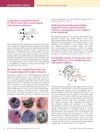
Search
for
Sort by
Research
270-300 / 1000+ results

research Comparison of the Incidence of Secondary Cancers After IMRT, Brachytherapy, and Surgery for the Treatment of Prostate Cancer
Different prostate cancer treatments have similar risks of secondary cancers and related mortality when considering patient age and smoking history.

research Relationship of Dietary Intake of Omega-3 and Omega-6 Fatty Acids with Risk of Prostate Cancer Development: A Meta-Analysis of Prospective Studies and Review of Literature
Eating more omega-3 and less omega-6 fatty acids may lower the risk of developing prostate cancer.

research BJD Editor's Choice: Genetic Mutations in Greek Melanoma Patients, Dermoscopic Features of Pigmented Nodular Tumors, Herlitz Junctional Epidermolysis Bullosa in the Netherlands, and HDAC9 in Male-Pattern Baldness
Some Greek melanoma patients have gene mutations linked to increased cancer risk, a new color feature helps diagnose melanoma, the incidence of a skin condition in the Netherlands is rare, and a gene possibly affects male-pattern baldness.

research British Society for Dermatopathology 2011 Findings
Dermatologists give better information on pathology forms, hypersensitivity vasculitis is a common skin issue, misdiagnoses can occur, and various skin conditions are linked to loss of elastin or genetic factors.

research Crystal Structure and Synthesis of 17α-Acetoxy-Pregn-4,6-Diene-3,20-Dione
The compound was successfully made and shows potential for treating prostate cancer.

research P62 Pre-Clinical Pharmacological and Skin Penetration Profile of LDE255, a Novel and Specific Smoothened Antagonist
LDE225 is a promising skin-applied treatment for basal cell carcinoma with good skin penetration and effectiveness.

research Contents
The document concludes that new treatments for skin conditions are complex but effective, including spironolactone for female hair loss and propranolol for infantile hemangiomas.

research Detection of Membrane Androgen-Binding Site in Living Rat Prostate and Evaluation of Its Role in Prostate Blood Flow Regulation
The research found that androgens help control blood flow in the rat prostate through a specific binding site.

research Innovations in Chemotherapy and Radiation Therapy: Implications and Opportunities for the Asia-Pacific Rim
New cancer treatments are more precise and less toxic, improving survival rates, but Asia faces challenges in adopting these advancements.

research Dermatological History and Examination
A thorough history and examination are crucial for diagnosing skin diseases, which affect up to a third of people. This includes details about skin lesions, medication, general health, lifestyle, family, and contacts, as well as examining the rash, hair, nails, and mucous membranes. Changes in hair and nails can also indicate other medical and skin disorders.

research Crystal Structure and Synthesis of 17α-Acetoxy-4-Bromopregn-4-Ene-3,20-Dione
The document concludes that a compound with potential for treating prostate cancer and hair loss was successfully made and its detailed structure was confirmed.

research Westwood Carolina Conference on Clinical Dermatology
Experts discussed hair care, genetic hair defects, hair loss treatments, nail surgery, lupus treatments, skin infections, and cosmetic allergies.

research Male Pattern Hair Loss: The Selfless Gene
Male pattern hair loss may have evolved to promote younger fathers for offspring health and survival, encouraging monogamy and paternal nurturing.

research Standards of Care for the Health of Transsexual, Transgender, and Gender-Nonconforming People, Version 7
The guidelines recommend informed consent for gender-affirming treatments and stress the importance of personalized, culturally sensitive care for transgender individuals.

research Polycystic Ovary Syndrome: Etiology, Pathogenesis, and Diagnosis
The document concludes that PCOS is a complex disorder caused by both genetic and environmental factors, affecting women's health in various ways, and requires personalized treatment.

research Comprehensive Overview of Polycystic Ovary Syndrome
Polycystic Ovary Syndrome (PCOS) is a common condition in women that can cause metabolic, reproductive, and psychological issues, and requires lifestyle changes and medication for management.

research Use of Chemotherapy During Human Pregnancy
Chemotherapy in the first trimester of pregnancy is risky, but in the second and third trimesters, it's generally safe with careful drug selection and timing.

research Modulating the Stem Cell Niche for Tissue Regeneration
Changing the environment around stem cells could help tissue repair, but it's hard to be precise and avoid side effects.

research Keratins in Health and Cancer: More Than Mere Epithelial Cell Markers
Keratins help protect cells, aid in cancer diagnosis, and influence cancer behavior and treatment.

research Colon Cancer Stem Cells: Promise of Targeted Therapy
Targeting colon cancer stem cells might lead to better treatment results.

research Phenotypic Plasticity: Driver of Cancer Initiation, Progression, and Therapy Resistance
Understanding phenotypic plasticity is crucial for developing effective cancer therapies.

research Treatment of Invasive Aspergillosis with Itraconazole
Itraconazole is potentially effective for treating invasive aspergillosis, but more research is needed.

research Fibroblast Heterogeneity: Implications for Human Disease
Different types of fibroblasts play various roles in diseases and healing, and more research on them could improve treatments.

research Air Pollution and Skin Diseases: Adverse Effects of Airborne Particulate Matter on Various Skin Conditions
Air pollution worsens skin diseases and aging by causing inflammation and oxidative stress.

research Aging and Immortality: Quasi-Programmed Senescence and Its Pharmacologic Inhibition
The conclusion is that using drugs to block the TOR pathway might slow aging and prevent age-related diseases.

research The Circadian Molecular Clock Creates Epidermal Stem Cell Heterogeneity
The circadian clock affects skin stem cell behavior, impacting aging and cancer risk.

research Anatomy and Physiology of the Skin
The skin's layers protect, sense, and regulate the body's internal balance, but can be prone to cancer.

research Mucocutaneous Reactions to Chemotherapy
Chemotherapy can cause various skin reactions, with hair loss being the most common, and proper diagnosis and treatment of these reactions are important.

research The North American Menopause Society Recommendations for Clinical Care of Midlife Women
The NAMS 2014 recommendations guide healthcare providers on treating health issues in midlife women, emphasizing individualized care and informed decision-making.